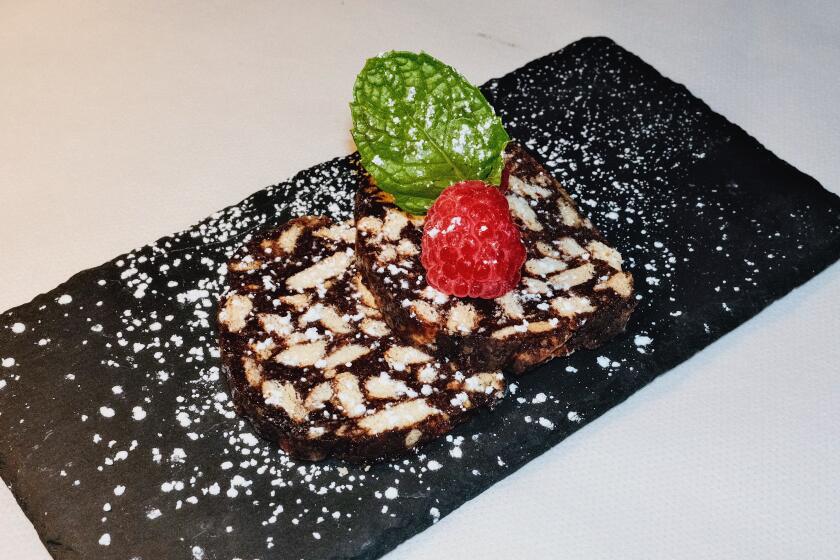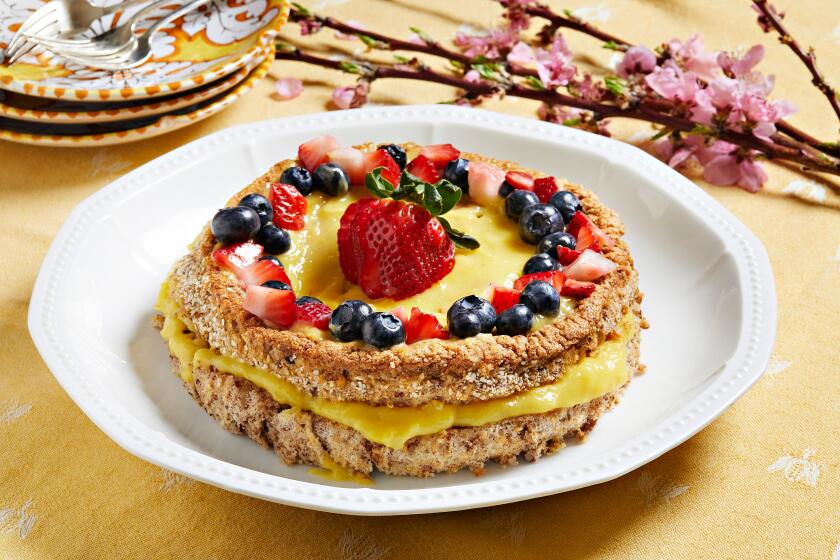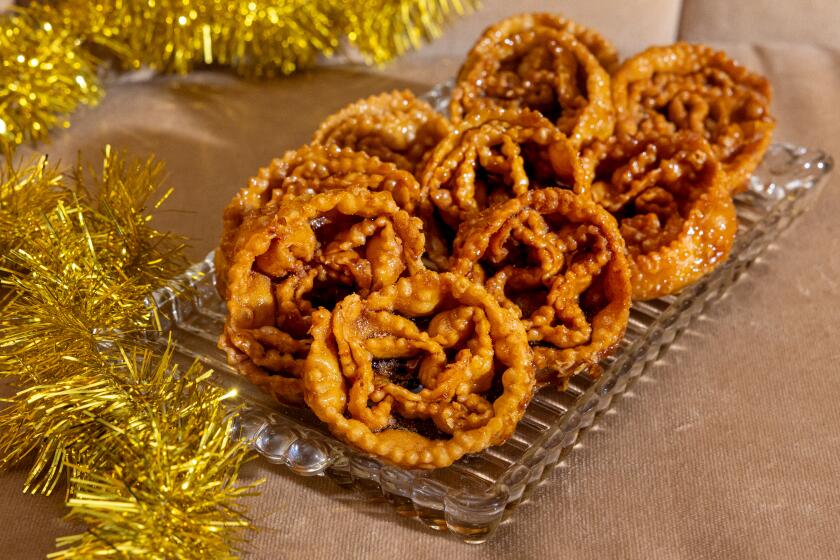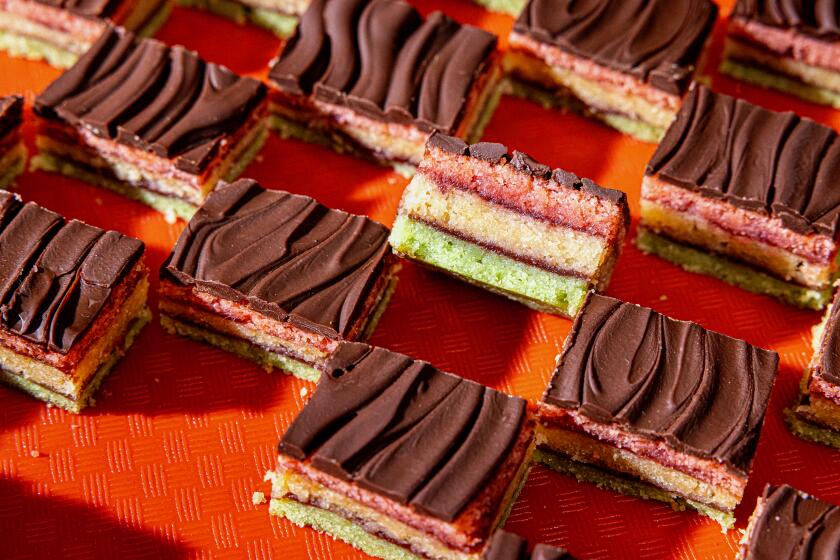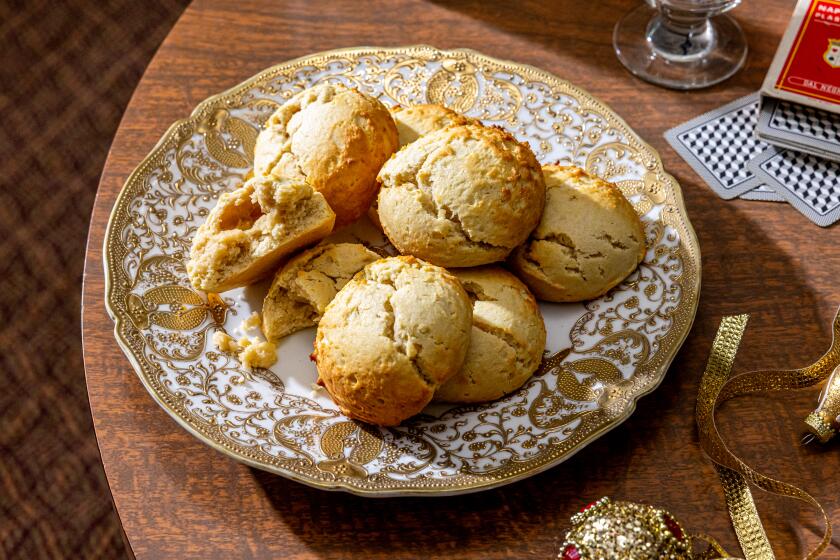Licorice ice cream
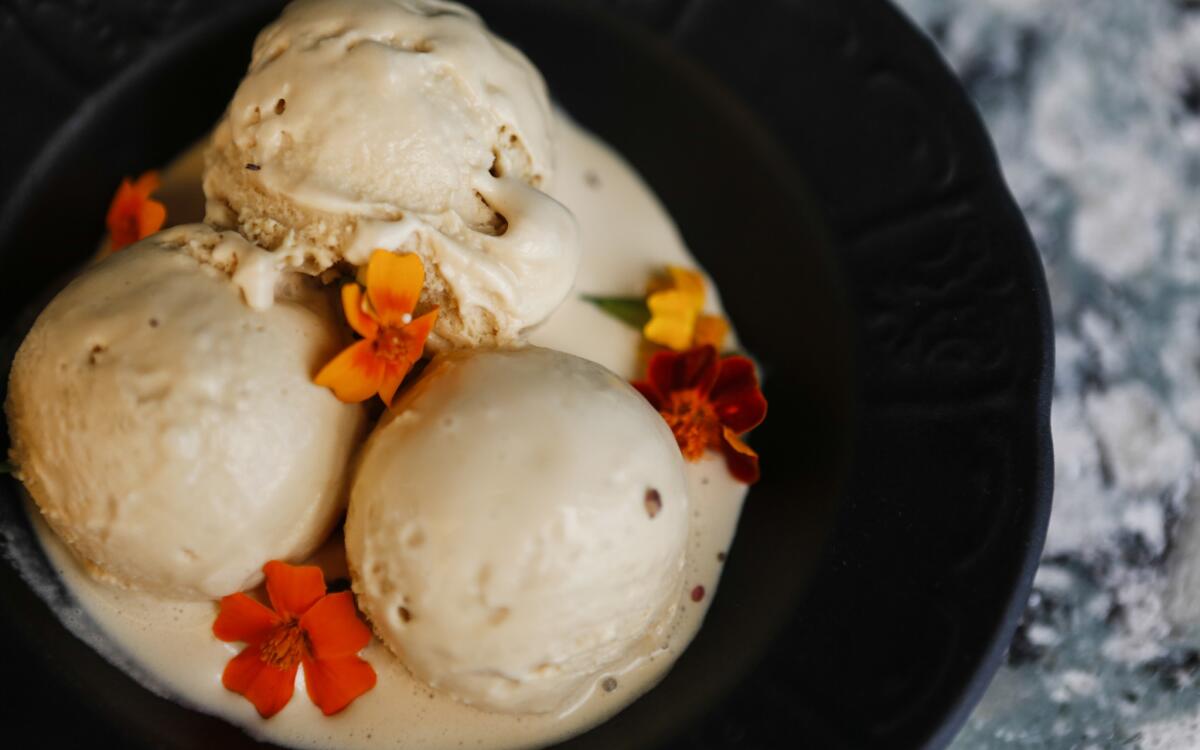
- Share via
Before January 2017, pastry chef Genevieve Gergis, who along with her chef husband, Ori Menashe, runs the Los Angeles restaurants Bestia and Bavel, was a self-proclaimed “not a licorice person.” Then she tasted licorice candy that a customer brought her from Copenhagen. Called Lakrids, it’s salt- and caramel-chocolate-coated licorice that’s shaped like a small ball bearing. At the time of Gergis’ licorice conversion, she was on a flight from LAX to Washington, D.C., where she and some of her female staffers were headed to participate in the Women’s March.
One bite of Lakrids and she was compelled to put words to the birth of her new mission. “This is delicious,” Gergis says she announced to the entire plane. “I’m going to figure out how to make a dessert with the flavor profile.”
What Gergis didn’t realize was that to keep that promise she would have to embark on a global search for licorice powder.
“I tried everywhere,” she says about a hunt that began domestically, where all she could find were black licorice twists or the sort of organic digestive remedies sold online. The latter, she learned after purchase, were “straight-up dried-out roots, like for a potion” and which, after steeping and straining, yielded a flavor that was “sawdusty” and “gross.”
Next Gergis turned to countries where the herbaceous plant extract is taken seriously. Along the way she discovered that the highest-quality licorice comes from Afghanistan, Iran, the Calabrian region of Italy and parts of Asia. It turns out that every April in Stockholm there’s Lakritsfestivalen, a sort of Comic-Con for the licorice-obsessed.
Her journey ended where it began: While browsing the Copenhagen-based Lakrids website Gergis found a section that sold professional, chef-sized containers of fine licorice powders sourced from around the world.
Recently, on a cool afternoon, Gergis sat in the empty dining room at Bavel (the Middle Eastern restaurant opened in April), surrounded by an intercontinental collection of jars of dark and light powders, as well as a raw version — sent in error — that resembled black aquarium gravel. Menashe remembered his former boss Gino Angelini’s affection for meat and licorice root (Angelini is the Italian-born chef-owner of the beloved Los Angeles restaurant Angelini Osteria), and Bavel’s licorice-basted lamb saddle chops, made with the raw version, were born.
As for Gergis’ original self-imposed dessert challenge, tracking down the right powder turned out to be just the first hurdle. To her surprise, figuring how to turn a small and satisfying candy into a last course was just as labor-intensive.
“I had so many different iterations of it,” says Gergis, who kept ending up with “disgustingly, indelibly sweet” results, until she realized that she wasn’t aiming to actually replicate a piece of Lakrids candy, just use it as an influence to create an homage to its flavors. It was, she says, “a freeing moment.”
Not much later, her licorice ice cream bon bon — made with licorice ice cream, sour licorice caramel, muscovado cake, caramelized white chocolate and Maldon salt — was on the menu. Los Angeles Times restaurant critic and Lakrids devotee Jonathan Gold declared it “staggeringly close” to the target flavor profile.
If Gergis’ approach — she’s a big fan of researching via rabbit-hole Googling — sounds unconventional, it’s because she’s an accidental pastry chef.
Her father’s job — head of the Infrared department at Rockwell-Boeing — offers insight into her scientific grasp of ingredients and their chemical properties. But her interest in food isn’t rooted in cozy dining-room-table memories in Thousand Oaks, where she was born and raised. “My mom’s a social worker and she’s amazing,” Gergis says. “But she’s a horrible cook and she knows it.”
A music major at USC — she played French horn — she skipped rehearsals and as a stress-reliever baked cookies, but without recipes. “I’m super ADD, if you haven’t already noticed,” Gergis says. “If I looked at a recipe in a cookbook it would give me super anxiety.”
Her decision to become a pastry chef has a Hollywood-style, plucked-from-obscurity quality: In 2011, she and Menashe, who met while both were working at the since shuttered La Terza (another of Angelini’s Italian restaurants), were preparing to open Bestia, where she’d run front of house and he’d be in charge of cooking. Everything changed when she brought some of her walnut shortbread cookies to a friend’s funeral. As the story goes, food writer Carolynn Carreño ate one of Gergis’ cookies — then handed another to Mozza’s Nancy Silverton. “I said, ‘Nancy, eat this cookie,’ and she was, like, ‘These are amazing,’ ” says Carreño, who remembers that it took some convincing to get Gergis to take over Bestia’s pastry department.
“She was, like, ‘I don’t know,’ and I told her, ‘It’s rustic food — you’re not going to be making spun-sugar desserts,” says Carreño, who arranged for Gergis to stage at Chez Panisse in Berkeley.
Gergis’ next chapter, however, has more elements of harsh reality. Learning a brand-new profession by trial and error — she made her first-ever ice cream base three days before opening Bestia — often meant that 30 minutes before service, Gergis would be tossing out a bad batch of crostata and starting from scratch.
“I’d stay until 3 or 4 in the morning, trying to get my panna cotta to be perfect,” she says.
Yet the combination of a great palate, lack of experience and doggedness is what makes her so fearless, Menashe says.
“She doesn’t know what’s wrong,” he says. “She doesn’t know the rules.” As opposed to many chefs who have base recipes, Gergis always starts at ground zero.
“I have a lot of friends who will go, ‘Oh, it’s strawberry season. I’ll take my base recipe and build off of it to create a strawberry dessert.’ I don’t have a base recipe,” Gergis says. “I’ll taste something, get inspired and then just go backwards.”
In a pot, combine 3/4 cup sugar and licorice powder and whisk to combine to help prevent clumping. Then add the molasses, salt, cream and 1½ cups milk. Steep thoroughly until the mixture starts to steam but does not come to a boil. Even if the licorice root clumps in the beginning, it should be thoroughly dissolved by this point.
When the ice cream base is fully steeped, in a large bowl, whisk the remaining 2 tablespoons sugar with the egg yolks. Slowly temper in the hot liquid while whisking. Add the mixture back into the pot and cook on very low heat while making sure to continuously scrape a spatula back and forth across the bottom of the pot, until the mixture can coat the back of a spoon, 3 to 5 minutes.
Strain into a mixing bowl with a fine mesh strainer, then add the reserved cold milk and the anise oil and citric acid. (If using lemon juice, do not add lemon juice to the hot mixture. Wait until the mixture is thoroughly chilled before incorporating.)
Chill thoroughly, then freeze according to your ice cream machine manufacturer’s instructions.
Get our Cooking newsletter
Get a taste of Los Angeles — and the world — with recipes and kitchen tricks from the L.A. Times’ Cooking newsletter.
You may occasionally receive promotional content from the Los Angeles Times.










